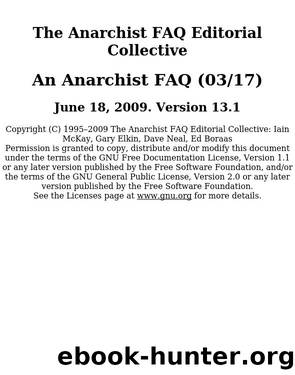An Anarchist FAQ (0317) by The Anarchist FAQ Editorial Collective & The Anarchist FAQ Editorial Collective

Author:The Anarchist FAQ Editorial Collective & The Anarchist FAQ Editorial Collective
Language: eng
Format: epub
Tags: affinity groups, An Anarchist FAQ, anarcho-communist, anti-capitalist, anti-civ, anti-voting, autonomy, Benjamin Tucker, bibliography, capitalism, children, Chile, class, crime, crisis, critique, democracy, direct action, ecology, economics, environment, ethics, feminist, France 1968, green, health, Herbert Spencer, history, Iain McKay, individualist, introductory, Leninism, marxism, Max Stirner, media, movement, Nestor Makhno, not-anarchist, organization, oxymoron, Paris Commune, platform, practice, prefigurative politics, primitivist, propaganda of the deed, property, proprietarians, reformism, religion, revolution, Russian Revolution, science, self-determination, sexuality, socialism, social revolution, society, Spain 1936, symbols, syndicalist, technology, terrorism, theory, the State, trade, trade unions, Trotskyism, vanguard, violence, work
Published: 2009-08-14T16:00:00+00:00
This is unsurprising. For anarchists, âthe State organisation ... [is] the force to which minorities resorted for establishing and organising their power over the masses.â It does not imply that these minorities need to be the economically dominant class in a society. The state is âa superstructure built to the advantage of Landlordism, Capitalism, and Officialism.â [Evolution and Environment, p. 82 and p. 105] Consequently, we cannot assume that abolishing one or even two of this unholy trinity will result in freedom nor that all three share exactly the same interests or power in relation to the others. Thus, in some situations, the landlord class can promote its interests over those of the capitalist class (and vice versa) while the state bureaucracy can grow at the expense of both.
As such, it is important to stress that the minority whose interests the state defends need not be an economically dominant one (although it usually is). Under some circumstances a priesthood can be a ruling class, as can a military group or a bureaucracy. This means that the state can also effectively replace the economically dominant elite as the exploiting class. This is because anarchists view the state as having (class) interests of its own.
As we discuss in more detail in section H.3.9, the state cannot be considered as merely an instrument of (economic) class rule. History has shown numerous societies were the state itself was the ruling class and where no other dominant economic class existed. The experience of Soviet Russia indicates the validity of this analysis. The reality of the Russian Revolution contrasted starkly with the Marxist claim that a state was simply an instrument of class rule and, consequently, the working class needed to build its own state within which to rule society. Rather than being an instrument by which working class people could run and transform society in their own interests, the new state created by the Russian Revolution soon became a power over the class it claimed to represent (see section H.6 for more on this). The working class was exploited and dominated by the new state and its bureaucracy rather than by the capitalist class as previously. This did not happen by chance. As we discuss in section H.3.7, the state has evolved certain characteristics (such as centralisation, delegated power and so on) which ensure its task as enforcer of minority rule is achieved. Keeping those characteristics will inevitably mean keeping the task they were created to serve.
Thus, to summarise, the stateâs role is to repress the individual and the working class as a whole in the interests of economically dominant minorities/classes and in its own interests. It is âa society for mutual insurance between the landlord, the military commander, the judge, the priest, and later on the capitalist, in order to support such otherâs authority over the people, and for exploiting the poverty of the masses and getting rich themselves.â Such was the âorigin of the State; such was its history; and such is its present essence.
Download
This site does not store any files on its server. We only index and link to content provided by other sites. Please contact the content providers to delete copyright contents if any and email us, we'll remove relevant links or contents immediately.
What's Done in Darkness by Kayla Perrin(26586)
The Fifty Shades Trilogy & Grey by E L James(19073)
Shot Through the Heart: DI Grace Fisher 2 by Isabelle Grey(19053)
Shot Through the Heart by Mercy Celeste(18930)
Wolf & Parchment: New Theory Spice & Wolf, Vol. 10 by Isuna Hasekura and Jyuu Ayakura(17104)
Python GUI Applications using PyQt5 : The hands-on guide to build apps with Python by Verdugo Leire(16973)
Peren F. Statistics for Business and Economics...Essential Formulas 3ed 2025 by Unknown(16865)
Wolf & Parchment: New Theory Spice & Wolf, Vol. 03 by Isuna Hasekura and Jyuu Ayakura & Jyuu Ayakura(16813)
Wolf & Parchment: New Theory Spice & Wolf, Vol. 01 by Isuna Hasekura and Jyuu Ayakura & Jyuu Ayakura(16437)
The Subtle Art of Not Giving a F*ck by Mark Manson(14343)
The 3rd Cycle of the Betrayed Series Collection: Extremely Controversial Historical Thrillers (Betrayed Series Boxed set) by McCray Carolyn(14125)
Stepbrother Stories 2 - 21 Taboo Story Collection (Brother Sister Stepbrother Stepsister Taboo Pseudo Incest Family Virgin Creampie Pregnant Forced Pregnancy Breeding) by Roxi Harding(13609)
Scorched Earth by Nick Kyme(12759)
Drei Generationen auf dem Jakobsweg by Stein Pia(10960)
Suna by Ziefle Pia(10885)
Scythe by Neal Shusterman(10331)
International Relations from the Global South; Worlds of Difference; First Edition by Arlene B. Tickner & Karen Smith(9517)
Successful Proposal Strategies for Small Businesses: Using Knowledge Management ot Win Govenment, Private Sector, and International Contracts 3rd Edition by Robert Frey(9360)
This is Going to Hurt by Adam Kay(9165)
